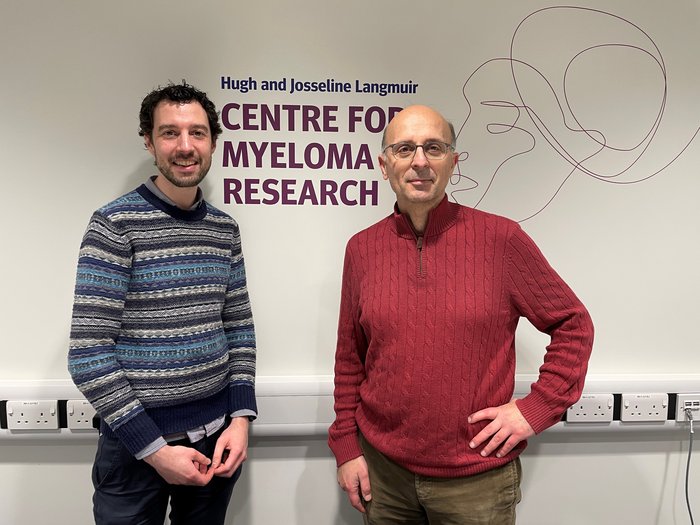Understanding key molecules that help myeloma cells to grow in number and thrive
Monoclonal gammopathy of undetermined significance (MGUS) is a blood condition affecting the plasma cells that can develop into a type of blood cancer called myeloma. Professor Karadimitris wants to understand more about a specific molecule that can cause people with MGUS to go on to develop myeloma.

Dr Anastasios Karadimitris
The challenge
Monoclonal gammopathy of undetermined significance (MGUS) is a blood condition that affects a type of white blood cell called plasma cells. In some people, MGUS can develop into a type of blood cancer called multiple myeloma. Scientists have identified four alterations that can cause MGUS. However, the additional alterations required that cause MGUS to develop into myeloma remain unknown.
The project
Professor Karadimitris and his team want to learn more about these additional alterations to understand how MGUS develops into myeloma. They believe that a molecule called CCND1 might be involved. This molecule helps both healthy and myeloma cancer cells to grow and has been found in other types of cancers to work with other molecules to alter how some cells behave. Professor Karadimitris and his team believe high levels of this molecule help myeloma cancer cells to grow in numbers and thrive. They plan to conduct experiments in the lab on cancer cells from people with myeloma and myeloma cells grown in the lab to learn more about how this molecule causes healthy plasma cells to become cancerous. Using advanced computer techniques, they hope to understand more about the characteristics of myeloma cancer cells and then test this knowledge by conducting further experiments in the lab.
The future
Professor Karadimitris hopes that his research will lead to a deeper understanding of how this molecule causes people to develop myeloma. If successful, his research could have important outcomes for treatment of myeloma as it could help to guide the development of new treatments that specifically target this molecule. Ultimately this could lead to new and better treatments for people with myeloma, getting us closer to a day where no lives are lost to blood cancer.

The research team Professor Karadimitris (right) and Dr Nick Crump (left)
Funding
This Clinical PhD Studentship is funded by the Matthew Wilson Multiple Myeloma Fund at Blood Cancer UK.
Read more about some of the other the projects funded by the Matthew Wilson Multiple Myeloma Fund.
